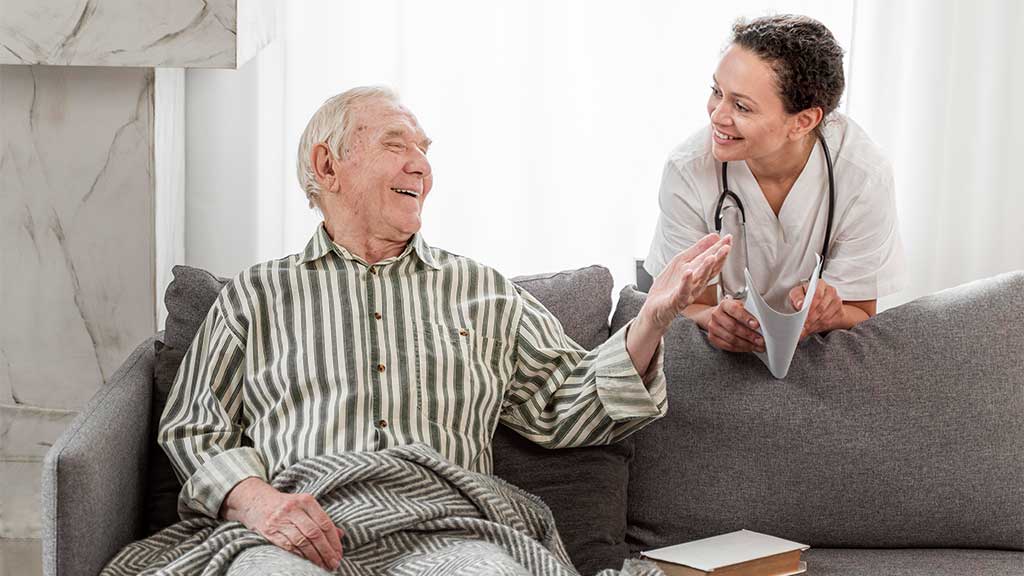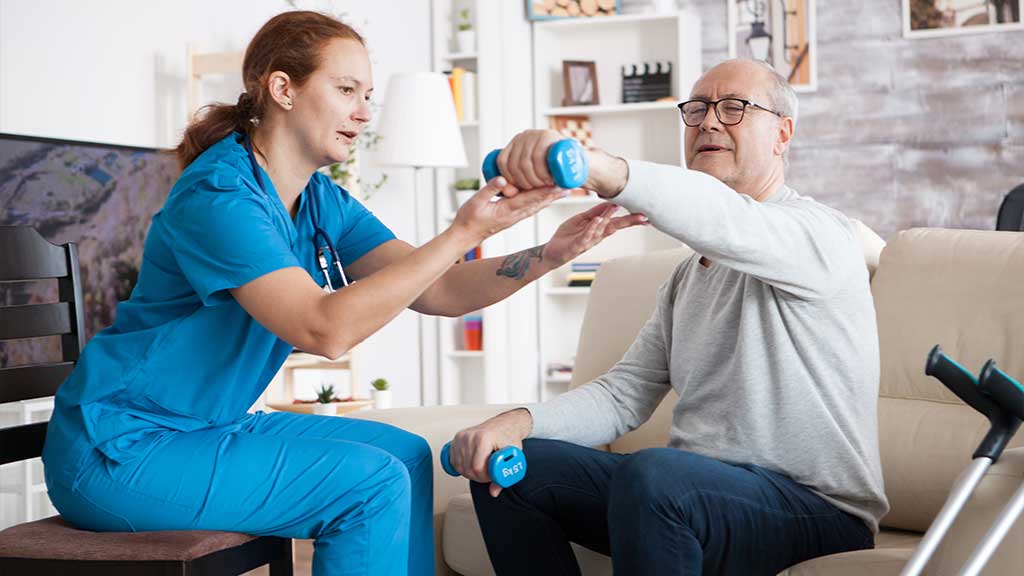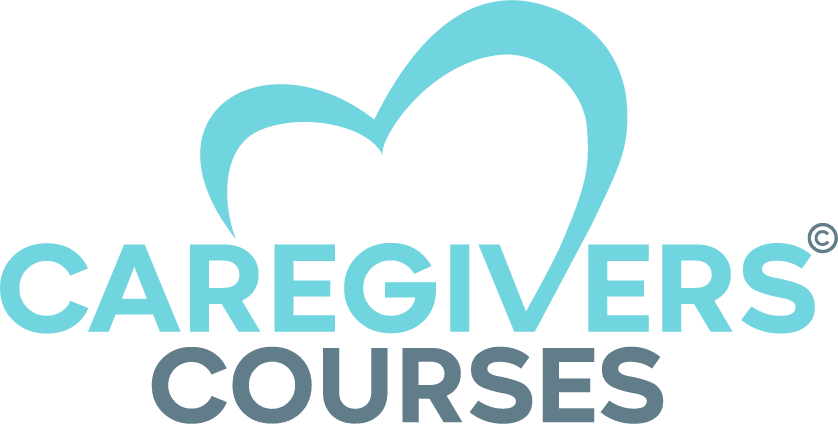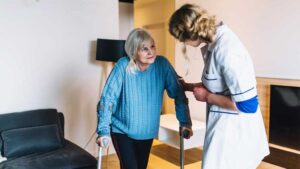The quality of life for people living with dementia can drastically reduce from the moment they’re diagnosed with the condition. This impact is even much more devastating for family members. That’s the situation for more than 7 million Americans above 65 years living with dementia.
The need for well-trained caregivers is expected to rise even further, as it’s estimated that cases of dementia will reach 9 million by 2030. That’s why it’s crucial for healthcare facilities to provide comprehensive dementia training for caregivers to ensure they’re well-equipped to care for this population.
This comprehensive guide helps home health care facility administrators understand dementia training for caregivers. It also reviews different dementia hacks and how to choose the right training program.
Benefits of Dementia Training for Caregivers
With the currently high population of people with dementia in the US, the importance of training care providers cannot be overstated. It helps care providers to be flexible and prepared to provide care in a manner that supports care recipients.
Understand dementia better
Most people assume that dementia is a disease with a specific cause, but that’s far from the case. By undergoing training, caregivers can understand what it is, how it comes to be, and the challenges it causes. This helps care providers to support persons with dementia even better.
Enhance the level of care
Various types of dementia present different symptoms. By understanding this, caregivers are better positioned to provide the appropriate care. For instance, caring for a person with Lewy body differs from providing care to someone with Alzheimer’s.
Better communication
Dementia training for caregivers prepares care providers with essential communication skills to deal with problems such as speech impairment. By understanding the type of dementia, caregivers can communicate and connect with care recipients better. Also, they learn how to question family members of those with dementia to better understand their conditions.
Ability to predict changes

Each type of dementia has a certain course of progression. By knowing this, caregivers can plan for any likely occurrences before they happen. This also helps caregivers set realistic expectations so they don’t become overwhelmed.
Better stress management
At times, not understanding why a care recipient behaves in a certain way can be frustrating. This can make a caregiver’s work stressful. However, through dementia training, care providers know the cause of certain behaviors and learn to remain patient with the client.
Raising awareness
By understanding the type of dementia, caregivers can know how to explain a care recipient’s conditions to healthcare professionals.
Types Of Dementia Training For Caregivers
The types of dementia training are categorized according to the skills they impart to caregivers to provide all-round care. There’s a wide spectrum of caregiver training courses for dementia care. Here are the most essential types:
Communication
As dementia progresses, communication with others becomes a challenge for care recipients. Conversations may appear repetitive and can prove difficult to follow along. Through training, caregivers can learn how to prompt and encourage them to communicate effectively. Caregivers also acquire essential communication skills as Alzheimer’s disease progresses to the late stage.
Activities of daily living (ADL)
ADL is crucial as it helps persons with dementia maintain their hygiene and enhance their quality of life. When dementia progresses, carrying out these activities themselves becomes a challenge. Caregivers who’ve undergone training can assist with these activities, such as bathing, nail care, dressing, shaving, dental hygiene, and brushing hair.
Nutrition
The eating habits of persons with dementia also change drastically. At a later stage of the condition, care recipients may experience difficulty chewing and swallowing. With their memory affected, they may find it more difficult to navigate the kitchen and identify smells or tastes. Dementia training for caregivers prepares care providers for these changes and how to prepare and serve food to the patients.
In nutrition training, caregivers learn how to track meals, encourage healthy eating, prepare meals, and feed patients. They also learn how to guide persons with dementia in their decision-making and respecting their dignity. Most importantly, caregivers can learn how to manage complications such as choking.
Anxiety and Belligerence

Without dementia training, caregivers may not understand that aggressive behavior is associated with dementia. Training helps them identify, understand, and prepare to manage aggression. Some of the ways this behavior manifests are through:
- Restlessness
- Combative
- Verbal aggression
- Crying
- Shouting
Caregivers should be able to calm, soothe, and reassure care recipients when they become agitated or aggressive. Validation therapy can significantly help patients remain calm. The main idea behind validation therapy is to identify the appropriate response to emotions and behaviors.
Medication Management
Persons with dementia need help following their prescriptions. As the condition progresses, caregivers need to:
- Remind care recipients to take their medication.
- Prepare pills and follow the medication instructions.
- Give medication and track the administration.
- Monitor response and identify allergic side effects.
They’ll only be able to do this if they’re well-trained in safe medication management.
Activity Planning
Persons with dementia need both mental and physical stimulation to improve their motor and cognitive skills. They also need to stay socially active to experience a better quality of life. Through dementia training for caregivers, the latter will be able to:
- Design and prepare activities of different difficulty levels.
- Identify safe activities that patients can participate in.
- Induce past interests or create new ones.
- Build lasting experiences.
After training, caregivers will also understand how to read a patient’s response toward certain activities that they like or resent. This will help them prepare activities that are beneficial and that patients will respond to positively.
Abuse Prevention
Due to the nature of the condition, dementia patients are exposed to all sorts of abuse. Caregivers need to be vigilant to identify potential abuse and protect care recipients by reporting it through the proper channel.
Taking care of persons with dementia can at times be frustrating, and this may also affect a caregiver’s response. Dementia training prepares caregivers on how to deal with feelings of frustration without unintentionally turning into abusers.
Motion Therapy

Caring for a person with dementia also entails helping them with movement and exercise. Studies show that regularly engaging dementia patients in physical activity is one of the non-pharmaceutical ways to improve their quality of life. Dementia caregivers must therefore be conversant with motion therapy.
Caregivers need to know different types of exercises that stimulate joint movements to prevent bedsores, pressure sores, and other joint complications. They can only learn this through dementia training. This means that every agency or facility needs to offer comprehensive training with practical dementia training activities for staff.
Building Your Caregiver’s Knowledge of Dementia and Alzheimer’s
Training your staff on dementia is a crucial step to ensuring they’re well-equipped to provide high-quality care. To benefit the most from a training course, they also need fundamental knowledge about Alzheimer’s and other types of dementia.
A comprehensive training course should therefore include important information such as:
- Alzheimer’s disease stages and symptoms.
- Challenging behaviors and difficulties of Alzheimer’s patients.
- Caregivers’ self-care
Alzheimer’s Disease, Stages, and Symptoms
One of the leading causes of dementia is Alzheimer’s disease, a progressive neurodegenerative disorder. It’s characterized by abnormal protein accumulation in the brain, causing gradual deterioration of brain cells and cognition.
Pre-clinical Alzheimer’s Disease
This is the first phase of the disease and is usually characterized by no symptoms. At this stage, seniors appear normal, but changes are already taking place in their brains.
Mild Cognitive Impairment (MCI)
The second stage, MCI, is often referred to as early-stage Alzheimer’s, and individuals may exhibit instances of difficulty finding words, mild memory loss, and problem-solving challenges. They may also suffer cognitive function decline, but they may still perform activities of daily living.
Mild Alzheimer’s Disease
At this stage, Alzheimer’s disease starts to manifest in more noticeable ways and interferes with ADL. The most common symptoms include confusion, memory loss, language difficulties, spatial orientation challenges, and difficulty performing familiar tasks.
Caregivers need to understand the key to successful communication with a person with Alzheimer’s disease when it reaches this level.
Moderate Alzheimer’s Disease

The symptoms begin to worsen, and individuals become more reliant on assistance to perform ADL. The symptoms advance to severe memory loss, trouble recognizing familiar faces, behavioral changes (aggression, sleep disturbance, wandering), and coordination problems. This condition causes irreversible dementia.
Severe Alzheimer’s Disease
As Alzheimer’s worsens, patients experience significant deterioration in cognitive abilities and need care around the clock. The symptoms at this advanced stage include loss of verbal communication, total memory loss, inability to move, swallowing difficulties, and incontinence. At this level, they may also contract infections or illnesses that can be life-threatening.
Dementia training for caregivers imparts the theoretical and practical skills needed to deal with Alzheimer’s disease as it progresses. Well-trained caregivers will be better positioned to not only care for dementia patients but will also take better care of themselves.
Self-care ensures caregivers can cope with the difficulties experienced in caring for Alzheimer’s patients. Facility administrators must therefore choose the right training course that also includes caregiver self-care.
How To Choose the Right Dementia Training for Caregivers
With the right dementia training, your team of caregivers will have the expertise required to provide high-quality care. It will also enhance their professional qualifications and allow them to meet the needs of care recipients. In choosing the right training, ensure the training program has the following:
Training Accreditation
Confirm that the program not only offers certification upon completion but is also ANCC accredited. Ensure that the course also has Dementia Care Practice Recommendations from the Alzheimer’s Association. It should also allow you to view your staff’s training progress and print the certifications upon completion.
Scalability
Consider a training platform that can also support your team as it grows to match your changing needs. A scalable program also needs to include different features to accompany the packages included in the training. For example, CaregiversCourse.net offers the following:
- Specially customized curriculums
- Over 200 training resources and classes.
- Custom training content support.
- Automated training reminders.
- Multi-location support.
Cost

How much are you willing to spend on your employees’ training? Find a training platform that can provide a wholesome package for your entire team. This will greatly reduce your training costs while upskilling your caregivers’ team.
Choose Caregivercourses.net For Dementia Training
As an administrator, it’s vital to provide Dementia training for caregivers as part of the continuous staff growth initiative. Choose a reputable training provider to partner with for tailored training programs. Caregiver Courses offers hands-on learning experiences, activities to teach about dementia, and case studies to enhance caregiver engagement. Plus, you get to choose an organizational package for your team to significantly reduce your cost of training. Contact Caregiver Courses today to get started.
Frequently Asked Questions
What are the challenges of dementia caregivers?
Dementia caregivers may experience higher stress levels that may lead to anxiety or depression. However, through dementia training for caregivers, they can learn how to provide self-care to prevent these challenges from taking a toll on their bodies.
Who benefits from dementia training for caregivers?
Dementia training does not only equip caregivers with essential skills for offering appropriate care, but it also helps family members and clients. It helps anyone interacting with a dementia patient to understand the condition, communicate effectively, and provide personalized care.
What topics are included in a dementia training program?
Dementia training programs cover different topics such as dementia awareness, behavior management, communication skills, and safety considerations. They also include caregiver self-care, challenges of dementia care, and ethical and legal issues surrounding dementia care.
How long does dementia training for caregivers take?
The duration varies widely according to the training provider and the learning model. For instance, instructor-led programs may have defined timeframes that can last for several weeks. Self-paced programs, on the other hand, depend on the learner’s speed, consistency, and determination. Other trainings that include hands-on clinical experience or in-person workshops may also take longer.
Do dementia caregivers require a practicing license?
Generally, dementia caregivers don’t need a license. However, some states require caregivers to undergo training in facilities licensed to provide memory care services. If a dementia caregiver is a practicing home health aide (HHA) or a certified nurse assistant (CNA), they may be required to have state licensing before practicing. Caregivers should therefore strive to obtain appropriate training and certification depending on their jurisdiction, roles, and care setting.

![Dementia Training for Caregivers [Guide for Administrators]](https://caregivercourses.net/wp-content/uploads/2024/04/Dementia-Training-for-Caregivers.jpg)
![Self-Care for Caregivers [Tips from Experts]](https://caregivercourses.net/wp-content/uploads/2024/07/Self-Care-for-Caregivers-Tips-from-Experts-300x169.jpg)


